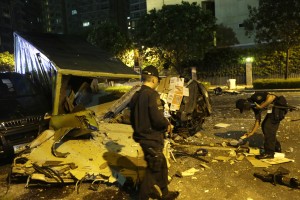
Police examine the scene after an explosion ripped through an apartment in the upscale district of Taguig city, east of Manila, Philippines, Friday, May 31, 2013. A loud explosion ripped through an apartment in Manila on Friday night, and a radio report said at least three people were killed by falling debris that hit a passing delivery van. AP
MANILA, Philippines — Philippine officials said Saturday they still do not know what caused a powerful explosion that ripped through an upscale apartment complex in the Philippine capital, killing three people in a van that was hit by debris.
Friday night’s blast blew out the walls of an apartment on the fifth floor, sending a slab of concrete flying onto the street below and smashing into a passing delivery van. It’s driver and two of his crew were crushed to death.
Five others, including an American and a 9-year-old, were injured, Interior Secretary Mar Roxas said.
The Office of Civil Defense earlier reported that three others had been killed in the building but later said that was wrong. Maj. Reynaldo Balido, spokesman for the agency, said the only fatalities were those in the van, adding that local civil defense officers mistakenly reported the deaths in the building.
The explosion hit the Serendra building, a plush condominium complex surrounded by restaurants and shops frequented by Manila’s upper class and expatriate community in Taguig city in metropolitan Manila.
Roxas told reporters Saturday that three separate teams of bomb sniffing dogs from the police and the army, which combed the wrecked apartment and the debris, did not find any indication of explosives.
“We are not yet saying that this was not caused by a bomb, but this is factual — these three teams did not register any fumes or residue of ordinary bombs,” he said.
“Right now, we still do not know what caused the explosion,” he added. “We are not ruling out anything.”
Authorities were initially looking into a gas supply issue, and residents were kept out of other buildings as officials checked the supply maintenance.
Roxas urged the public to refrain from speculating if the blast was linked to recent travel advisories issued by the U.S., British, Canadian and Australian governments for the restive southern Philippines, where they cited a risk of kidnappings and terrorist activities.
Muslim militants have targeted the Philippine capital in the past, but most attacks have been confined to the southern region, where minority Muslims have fought for self-rule for decades.